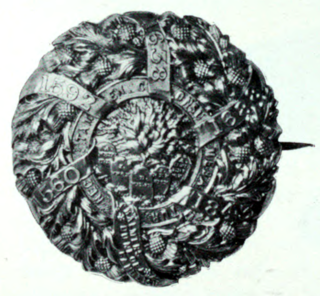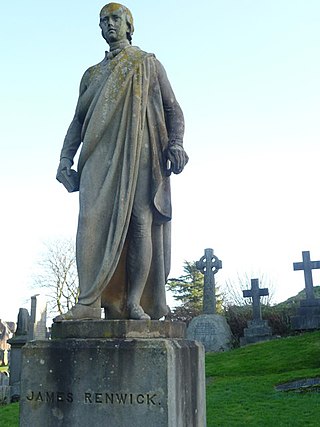
The Parliament of the United Kingdom of Great Britain and Northern Ireland is the supreme legislative body of the United Kingdom, and may also legislate for the Crown Dependencies and the British Overseas Territories. It meets at the Palace of Westminster in London. Parliament possesses legislative supremacy and thereby holds ultimate power over all other political bodies in the United Kingdom and the Overseas Territories. While Parliament is bicameral, it has three parts: the sovereign, the House of Lords, and the House of Commons. The three parts acting together to legislate may be described as the King-in-Parliament. The Crown normally acts on the advice of the prime minister, and the powers of the House of Lords are limited to only delaying legislation; thus power is de facto vested in the House of Commons.

Presbyterianism is a Reformed (Calvinist) Protestant tradition named for its form of church government by representative assemblies of elders. Though there are other Reformed churches that are structurally similar, the word Presbyterian is applied to churches that trace their roots to the Church of Scotland or to English Dissenter groups that formed during the English Civil War.

The Church of Scotland is a Presbyterian denomination of Christianity that holds the status of the national church in Scotland. It is one of the country's largest, having 259,200 members in 2023. While active membership in the church has declined significantly in recent decades, the government Scottish Household Survey found that 20% of the Scottish population, or over one million people, identified the Church of Scotland as their religious identity in 2019. The Church of Scotland's governing system is presbyterian in its approach, therefore, no one individual or group within the church has more or less influence over church matters. There is no one person who acts as the head of faith, as the church believes that role is the "Lord God's". As a proper noun, the Kirk is an informal name for the Church of Scotland used in the media and by the church itself.

The Westminster Confession of Faith, or simply the Westminster Confession, is a Reformed confession of faith. Drawn up by the 1646 Westminster Assembly as part of the Westminster Standards to be a confession of the Church of England, it became and remains the "subordinate standard" of doctrine in the Church of Scotland and has been influential within Presbyterian churches worldwide.
Disestablishmentarianism is a movement to end the Church of England's status as an official church of the United Kingdom.

The Free Church of Scotland is a Scottish denomination which was formed in 1843 by a large withdrawal from the established Church of Scotland in a schism known as the Disruption of 1843. In 1900, the vast majority of the Free Church of Scotland joined with the United Presbyterian Church of Scotland to form the United Free Church of Scotland. In 1904, the House of Lords judged that the constitutional minority that did not enter the 1900 union were entitled to the whole of the church's patrimony, the Free Church of Scotland acquiesced in the division of those assets, between itself and those who had entered the union, by a Royal Commission in 1905. Despite the late founding date, Free Church of Scotland leadership claims an unbroken succession of leaders going all the way back to the Apostles.
The United Free Church of Scotland is a Scottish Presbyterian denomination formed in 1900 by the union of the United Presbyterian Church of Scotland and the majority of the 19th-century Free Church of Scotland. The majority of the United Free Church of Scotland united with the Church of Scotland in 1929.

The Free Presbyterian Church of Scotland was formed in 1893. The Church identifies itself as the spiritual descendant of the Scottish Reformation. The Church web-site states that it is 'the constitutional heir of the historic Church of Scotland'. Its adherents are occasionally referred to as Seceders or the Wee Wee Frees. Although small, the church has congregations on five continents.

The Disruption of 1843, also known as the Great Disruption, was a schism in 1843 in which 450 evangelical ministers broke away from the Church of Scotland to form the Free Church of Scotland. The main conflict was over whether the Church of Scotland or the British Government had the power to control clerical positions and benefits. The Disruption came at the end of a bitter conflict within the Church of Scotland, and had major effects in the church and upon Scottish civic life.

The Killing Time was a period of conflict in Scottish history between the Presbyterian Covenanter movement, based largely in the southwest of the country, and the government forces of Kings Charles II and James VII. The period, roughly from 1679 to the Glorious Revolution of 1688, was subsequently called The Killing Time by Robert Wodrow in his The History of the Sufferings of the Church of Scotland from the Restoration to the Revolution, published in 1721–22. It is an important episode in the martyrology of the Church of Scotland.
The Articles Declaratory of the Constitution of the Church of Scotland – often known as the Declaratory Articles - were drawn up early in the 20th century to facilitate the union of the Church of Scotland and the United Free Church of Scotland. The "declaratory" nature of the Articles means that they are intended to define or "declare" a status that already existed, but explicitly spelt out for the avoidance of doubt. By an Act of Parliament – The Church of Scotland Act 1921 – the Articles Declaratory were held to be lawful, thus recognising the Church of Scotland as the national church in Scotland but independent from the state in matters spiritual. They are still in force. Special procedures are required to amend the Articles Declaratory, but Article I cannot be altered.

The General Assembly of the Church of Scotland is the sovereign and highest court of the Church of Scotland, and is thus the Church's governing body. It generally meets each year and is chaired by a Moderator elected at the start of the Assembly.

The Church Patronage (Scotland) Act 1711 or Patronage Act is an Act of the Parliament of Great Britain. The long title of the act is An Act to restore the Patrons to their ancient Rights of presenting Ministers to the Churches vacant in that Part of Great Britain called Scotland. Its purpose was to allow the noble and other Patrons in Scotland to gain control over the Church of Scotland parish churches again, having lost that custom in the Glorious Revolution.

As of the 2011 census, Christianity was the largest religion in Scotland, chosen by 53.8% of the Scottish population identifying when asked: "What religion, religious denomination or body do you belong to?" This represented a decline from the 2001 figure of 65.1%. More recent polls of public opinion have shown that the majority today consider themselves non-religious. In 2017, the Scottish Social Attitudes Survey, conducted by ScotCen Social Research found that 58% of Scots identified themselves as non-religious, compared to 40% in 1999.
The Basis of Union of the Presbyterian Church of Australia is the document under which the constituent state churches agreed to unite at its first General Assembly on 24 July 1901, and is still a foundational text for the Uniting Church. The Basis of Union appears in Acts of Parliament concerning the Presbyterian Church of Australia.

The formation of the United Kingdom of Great Britain and Northern Ireland has involved personal and political union across Great Britain and the wider British Isles. The United Kingdom is the most recent of a number of sovereign states that have been established in Great Britain at different periods in history, in different combinations and under a variety of polities. Historian Norman Davies has counted sixteen different states over the past 2,000 years.

The constitution of the United Kingdom comprises the written and unwritten arrangements that establish the United Kingdom of Great Britain and Northern Ireland as a political body. Unlike in most countries, no official attempt has been made to codify such arrangements into a single document, thus it is known as an uncodified constitution. This enables the constitution to be easily changed as no provisions are formally entrenched.

Scottish religion in the nineteenth century includes all forms of religious organisation and belief in Scotland in the 19th century. This period saw a reaction to the population growth and urbanisation of the Industrial Revolution that had undermined traditional parochial structures and religious loyalties. The established Church of Scotland reacted with a programme of church building from the 1820s. Beginning in 1834 the "Ten Years' Conflict" ended in a schism from the established Church of Scotland led by Dr Thomas Chalmers known as the Great Disruption of 1843. Roughly a third of the clergy, mainly from the North and Highlands, formed the separate Free Church of Scotland. The evangelical Free Church and other secessionist churches grew rapidly in the Highlands and Islands and urban centres. There were further schisms and divisions, particularly between those who attempted to maintain the principles of Calvinism and those that took a more personal and flexible view of salvation. However, there were also mergers that cumulated in the creation of a United Free Church in 1900 that incorporated most of the secessionist churches.

The Irish Appeals Act 1783, commonly known as the Renunciation Act, was an Act of the Parliament of Great Britain. By it the British Parliament renounced all right to legislate for Ireland, and declared that no appeal from the decision of any court in Ireland could be heard in any court in Great Britain.
The issue of Ireland has been a major one in British politics, intermittently so for centuries. Britain's attempts to control and administer the island, or parts thereof, have had significant consequences for British politics, especially in the 19th and 20th centuries. Although nominally autonomous until the end of the 18th century, Ireland became part of the United Kingdom of Great Britain and Ireland in 1801.















